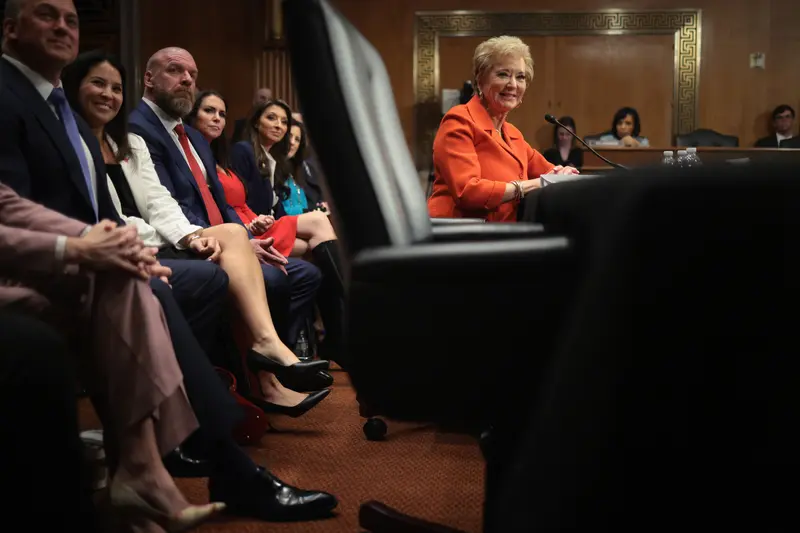Education Secretary Linda McMahon has been clear about her desire to shut down the agency she runs. She’s laid off half the staff and joked about padlocking the door.
She calls it “the final mission.”
But the department is not behaving like an agency that is simply winding down. Even as McMahon has shrunk the Department of Education, she’s operated in what she calls “a parallel universe” to radically shift how children will learn for years to come. The department’s actions and policies reflect a disdain for public schools and a desire to dismantle that system in favor of a range of other options — private, Christian and virtual schools or homeschooling.
Over just eight months, department officials have opened a $500 million tap for charter schools, a huge outlay for an option that often draws children from traditional public schools. They have repeatedly urged states to spend federal money for poor and at-risk students at private schools and businesses. And they have threatened penalties for public schools that offer programs to address historic inequities for Black or Hispanic students.
McMahon has described her agency moving “at lightning rocket speed,” and the department’s actions in just one week in September reflect that urgency.
The agency publicly blasted four school districts it views as insubordinate for refusing to adopt anti-trans policies and for not eliminating special programs for Black students. It created a pot of funding dedicated to what it calls “patriotic education,” which has been criticized for downplaying some of the country’s most troubling episodes, including slavery. And it formed a coalition with Turning Point USA, Hillsdale College, PragerU and dozens of other conservative groups to disseminate patriotic programming.
Officials at the Education Department declined to comment or answer questions from ProPublica for this story.
At times, McMahon has voiced support for public schools. But more often and more emphatically she has portrayed public schools as unsuccessful and unsafe — and has said she is determined to give parents other options.
To carry out her vision, McMahon has brought on at least 20 political appointees from ultraconservative think tanks and advocacy groups eager to de-emphasize public schools, which have educated students for roughly 200 years.
Among them is top adviser Lindsey Burke, a longtime policy director at The Heritage Foundation and the lead author of the education section in Project 2025’s controversial agenda for the Trump administration.
In analyzing dozens of hours of audio and video footage of public and private speaking events for McMahon’s appointees, as well as their writings, ProPublica found that a recurring theme is the desire to enable more families to leave public schools. This includes expanding programs that provide payment — in the form of debit cards, which Burke has likened to an “Amazon gift card” — to parents to cobble together customized educational plans for their children. Instead of relying on public schools, parents would use their allotted tax dollars on a range of costs: private school tuition, online learning, tutors, transportation and music lessons.
More than 8 in 10 elementary and secondary students in the U.S. go to a traditional public school. But Burke expects that public schools will see dramatic enrollment declines fueled by both demographic and policy changes.
Addressing an interviewer in an April podcast, she noted: “We’re going to have a lot of empty school buildings.”
In a 2024 podcast, Noah Pollak, now a senior adviser in the Education Department, bemoaned what he sees as progressive control of schools, which he said has led to lessons he finds unacceptable, such as teaching fourth graders about systemic racism.
“And so the work that I do is trying to come up with creative policy ideas to stop that, to turn back the tide, to figure out ways that conservatives can protect these institutions or build new institutions,” said Pollak, who has been an adviser to conservative groups.
As tax dollars are reallocated from public school districts and families abandon those schools to learn at home or in private settings, the new department officials see little need for oversight. Instead, they would let the marketplace determine what’s working using tools such as Yelp-like reviews from parents. Burke has said she is against “any sort of regulation.”
President Donald Trump himself said in July that the federal government needs only to provide “a little tiny bit of supervision but very little, almost nothing,” over the nation’s education system except to make sure students speak English.
Advocates for public schools consider them fundamental to American democracy. Providing public schools is a requirement in every state constitution.
Families in small and rural communities tend to rely more heavily on public education. They are less likely than families in cities to have private and charter schools nearby. And unlike private schools, public school districts don’t charge tuition. Public schools enroll local students regardless of academic or physical ability, race, gender or family income; private schools can selectively admit students.
Karma Quick-Panwala, a leader at the Disability Rights Education and Defense Fund, which advocates for disabled students, said she wants to be optimistic. “But,” she added, “I’m very fearful that we are headed towards a less inclusive, less diverse and more segregated public school setting.”
Allison Rose Socol, a policy expert at EdTrust, an organization focusing on civil rights in schools, decried what she called the “demo crew” in McMahon’s office. Socol described McMahon’s push to help grow private school enrollment through taxpayer-funded vouchers and other means as a “great American heist” that will funnel money away from the public system.
“It’s a strategic theft of the future of our country, our kids and our democracy,” she said.
Attention on McMahon often focuses on her former role as CEO of World Wrestling Entertainment. It was no different on the day of her Senate confirmation hearing, when journalists and social media delighted in noting that seated behind her was her son-in-law, the retired wrestler known as Triple H.
Little attention was paid to the conservative education activists in the front row from Moms for Liberty, which has protested school curricula and orchestrated book bans nationwide; Defending Education (formerly Parents Defending Education), which has sued districts to fight what it calls liberal indoctrination; and the America First Policy Institute, co-founded by McMahon after the first Trump administration.
Now two people who once served at Defending Education have been named to posts in the Education Department, and leaders from Moms for Liberty have joined McMahon for roundtables and other official events. In addition, at least nine people from the America First Policy Institute have been hired in the department.
AFPI’s sweeping education priorities include advocating for school vouchers and embedding biblical principles in schools. It released a policy paper in 2023, titled “Biblical Foundations,” that sets out the organization’s objective to end the separation of church and state and “plant Jesus in every space.”
The paper rejects the idea that society has a collective responsibility to educate all children equally and argues that “the Bible makes it clear that it is parents alone who shoulder the responsibility for their children.” It frames public schooling as failing, with low test scores and “far-left social experiments, such as gender fluidity.”
The first AFPI leader pictured in that report is McMahon.

Credit:
Win McNamee/Getty Images
AFPI and the other two nonprofit groups sprang up only after the 2020 election. Together they drew in tens of millions of dollars through a well-coordinated right-wing network that had spent decades advocating for school choice and injecting Christianity into schools.
Ultrawealthy supporters include right-wing billionaire Richard Uihlein, who, through a super PAC, gave $336,000 to Moms for Liberty’s super PAC from October 2023 through July 2024.
Defending Education and AFPI received backing from some of the same prominent conservative foundations and trusts, including ones linked to libertarian-minded billionaire Charles Koch and to conservative legal activist Leonard Leo, an architect of the effort to strip liberal influence from the courts, politics and schools.
Maurice T. Cunningham, a now-retired associate professor of political science at the University of Massachusetts, studied the origins and connections of parents’ rights groups, finding in 2023 that the funders — a small set of billionaires and Christian nationalists — had similar goals.
The groups want “to undermine teachers unions, protect their wealthy donors from having to contribute their fair share in taxes to strengthen public schools, and provide profit opportunities through school privatization,” he concluded. The groups say they are merely trying to advocate for parents and for school choice. They didn’t discuss their relationship with donors when contacted by ProPublica.
These groups and their supporters now have access to the top levers of government, either through official roles in the agency or through the administration’s adoption of their views.
When the department created an “End DEI” portal to collect tips about diversity, equity and inclusion initiatives in schools, it quoted Moms for Liberty co-founder Tiffany Justice in the press release. She encouraged parents to “share the receipts of the betrayal that has happened in our public schools.” Moms for Liberty referred to the portal as the “culmination” of Justice’s work. (Federal judges ruled against some of the administration’s anti-DEI actions and the department took the controversial portal down in May.)
Asked what percentage of children she imagines should be in public schools going forward, Justice, who is now with The Heritage Foundation’s political advocacy arm, told ProPublica: “I hope zero. I hope to get to zero.”
She and others say most public schools don’t teach students to read, are dividing children over race and are secretly helping students to change genders — familiar claims that have been widely challenged by educators.
When Trump signed an executive order in March to dismantle the Education Department, Justice sat in the first row, as she had at McMahon’s confirmation hearing. The president praised her, along with various governors and lawmakers. “She’s been a hard worker,” he said.
Defending Education’s Nicole Neily, who was also at McMahon’s confirmation, stood next to McMahon when the secretary announced an investigation into the Maine Department of Education for keeping records from parents about student gender identity plans. Defending Education has filed civil rights complaints against colleges and school districts and has been successful in having its causes taken up by the Trump administration.
In an email, Neily told ProPublica she is proud of the work that Defending Education has done to challenge schools that have supported DEI in their curricula and have allowed students to hide their gender identity from parents. She singled out teacher unions and “radical education activists” while blaming drops in student achievement on “the education-industrial complex.”
“The sooner this stranglehold is broken, the better,” she wrote.
McMahon’s tenure also has been marked by an embrace of religion in schools. She signaled that priority when she appointed Meg Kilgannon to a top post in her office.
Kilgannon had worked in the department as director of a faith initiative during the first Trump term and once was part of the Family Research Council, an evangelical think tank that opposes abortion and LGBTQ+ rights.
She has encouraged conservative Christians to become involved in what she’s described as “a spiritual war” over children and what they’re being taught in public schools.
Reached by phone, Kilgannon told ProPublica, “I have no comment,” and hung up.
Betsy DeVos, the Michigan billionaire who was education secretary in Trump’s first term, cheered on July 4 this year when Congress instituted America’s first federal voucher program. It came in the form of a generous tax credit program to encourage voucher expansion at the state level. Families can start accessing the aid beginning Jan. 1, 2027.
DeVos once said she wanted “to advance God’s kingdom” through vouchers for religious schools and has funneled vast amounts of her family fortune into advocating for school choice. She called the passage of the federal measure “the turning point in ending the one-size-fits-all government school monopoly.”
An article in The Federalist, a conservative publication, boiled down the implications into one headline: “How Trump’s Big, Beautiful Bill Will Help Kids Escape Failing Government Schools.”
But school choice isn’t the only tool that Trump’s education leaders are using to target public schools. McMahon has gutted the Education Department’s civil rights division, where lawyers and other federal employees work to ensure all students can access public school, free from discrimination.
The administration rolled back protections for LGBTQ+ students and students of color, prioritized investigating discrimination against white and Jewish students, and launched aggressive investigations of states and districts that it says refused to stop accommodating transgender students.
It has rescinded official guidance that said schools had to provide language help and other services for students who are learning English, contradicting long-established federal law.
And Trump officials have repeatedly cast public schools as dangerous even as the agency canceled about $1 billion in training grants for more school mental health professionals — money that had been authorized by Congress to help prevent school shootings. The administration now says it plans to resume paying out a fraction of that funding, which would be used for school psychologists.
Over and over, the department has used the threat of pulling federal funding to force compliance with new directives and rapid shifts in policy. The department, for instance, threatened to withhold money from schools that did not verify they were ending diversity initiatives, which were designed to address inequitable treatment of Black, Native and Latino students.
In August, the department announced it was withholding millions of dollars in grants from five northern Virginia school districts that had refused the department’s demands to bar transgender students from using restrooms and locker rooms that aligned with their gender identity. The districts argued that complying would mean defying Virginia law and a 2020 federal appeals court ruling.
Nevertheless, the Education Department told the districts that until they acquiesced to the agency’s bathroom rules they would have to pay expenses up front and request reimbursement. McMahon wrote to districts that “Lindsey Burke is available to answer any questions.”
The Fairfax County Public Schools sued and in a legal filing said it faced losing $167 million this school year, money that it was relying on to provide meals to students, support programs for children with disabilities, help English-language learners and enhance teacher training. The federal department has argued that it has discretion to withhold funding and admonished the district for taking the agency to court.
In this atmosphere, public school advocates are particularly concerned about what will happen to funding for Title I grants, which is the federal government’s largest program for schools and is aimed at helping students from low-income families. In early September, House Republicans proposed slashing more than $5 billion from the $18.4 billion earmarked for Title I, putting at risk reading and math teachers, tutors and classroom technology.
At the same time, under McMahon, the Education Department is trying to redefine how states and districts can spend the money.
In three guidance letters so far this year, the agency encouraged states to divert some Title I money away from public school districts. One suggested paying for outside services, such as privatized tutoring. Another urged states to use Title I money to benefit low-achieving students who live within the boundaries of a high-poverty public school but attend private schools.
McMahon is prepared to loosen even more rules on the money. The federal dollars currently are distributed to districts using a formula. Project 2025 calls for Title I to be delivered to states as block grants, or chunks of money with few restrictions. McMahon has encouraged states to ask her to waive rules on spending the money.
Critics of this approach fear that Title I money could eventually be used in ways that undermine public schools — on private school vouchers, for example.
Public school advocates like William Phillis, a former official at the Ohio Department of Education, fear the change would devastate public schools.
“I just know any block grant or any funding that would be left up to state officials on Title I money would be misappropriated in terms of the intent,” Phillis said. “Block grants to Ohio would go to the private sector.”
A spokesperson for the Ohio Department of Education and Workforce did not respond to requests for comment.
Rainey Briggs, chief of operations for Des Moines Public Schools in Iowa, said he supports parental choice but worries that public schools will suffer financially and will not have the resources to stay up to date.
And he fears that right-wing narratives around public schools, the distrust and lack of support for highly trained district leaders — whether from some parents or politicians — could lead accomplished educators to walk away.
“Public education is irreplaceable,” he said, citing its commitment to serve every child regardless of their background or circumstance.
Those influencing Trump’s education agenda disagree.
“If America’s public schools cease to exist tomorrow, America would be a better place,” Justice told ProPublica.
Illustrations by Pete Gamlen. Visual editing by Cengiz Yar. Design and development by Anna Donlan. Mollie Simon contributed research, and Brandon Roberts contributed reporting.
Great Job by Megan O’Matz and Jennifer Smith Richards & the Team @ ProPublica Source link for sharing this story.






